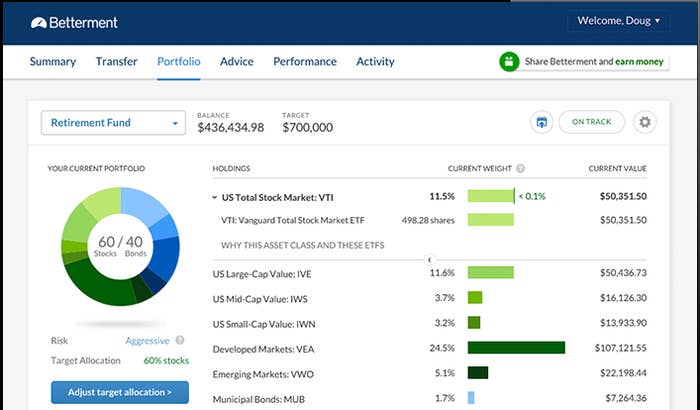
After a year where Betterment, the web-based financial adviser founded in 2010, saw the assets it manages grow by more than 300% and its head count more than double, the company said Thursday that it had raised another $60 million. This brings its total equity raised to $105 million, with the technology-focused private equity firm Francisco Partners leading the most recent round.
The funding round is another reminder of the growing investor interest in online startups that go after the bread-and-butter business of the financial services industry: advising people how to manage their savings. It's a huge, juicy business — industry giant Fidelity has more than $2 trillion under management — and one still heavily based in the world of office-based financial advisers and reams of paperwork. Betterment and others are racing to sign up younger customers looking for an all-digital service, but have still barely scratched the surface.
Betterment has $1.45 billion in assets under management and says that the mix has shifted toward higher-dollar-amount accounts, which traditional financial advisers usually chase because they generate more revenue. Its chief rival, Wealthfront, has $1.8 billion in assets under management and raised $64 million in October, at a reported valuation of $700 million.
Betterment co-founder and chief executive officer Jon Stein told BuzzFeed News in an interview that instead of actively going after new money, the big haul was "opportunistic," with the company's growth raising interest among investors.
"We looked at our own priorities for the coming year, and with more capital we could do things even faster," Stein said. That includes investing more in its recently launched Betterment Institutional product, which lets independent financial advisers use Betterment tools with clients, as well as more marketing.
"We have long felt that the wealth management space was overdue for a solution that could better serve the majority of Americans through smarter technology," said Peter Christoduolo of Francisco Partners in a statement. "Betterment's unique, vertically integrated architecture allows its platform to be lightning fast, which is proving to be compelling with customers as thousands fund new accounts each month." Christoduolo will also join Betterment's board of directors.
Stein said Betterment is working on doing more individualized advice for its clients. Although this does mean recreating a version of the traditional financial adviser relationship, Stein said that by getting a consistent set of answers to questions that Betterment clients are likely to ask (whether to roll over IRAs, how much to contribute to different retirement accounts), Betterment will be able to give personalized advice through its existing web interface.
Betterment faces competition not only from other startups like Wealthfront, but also discount brokerage and adviser giant Charles Schwab, which announced last year that it would launch its own automated investment product, for free. Betterment has steadily rolled out new features, including new versions of its tax loss harvesting service, which automatically sells some securities that have declined in value to garner a tax benefit (Wealthfront does something similar), and its service that lets customers see the tax impact of a potential sale.
"There are close followers out there, but we're not basing an agenda on what those guys are doing," Stein said. "We've seen others at least on a surface level try to imitate some of the things that we've done."
